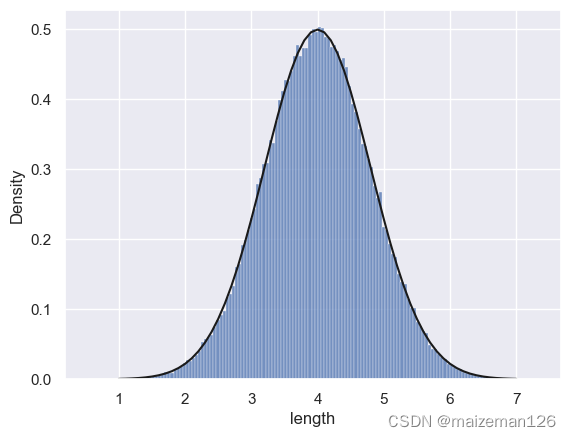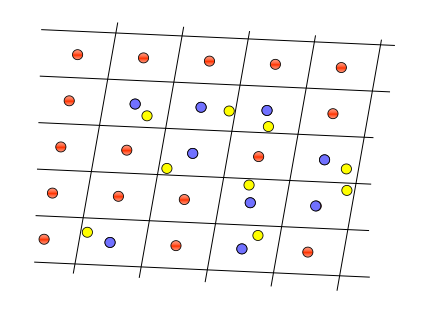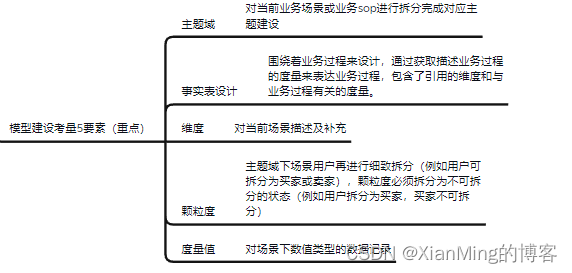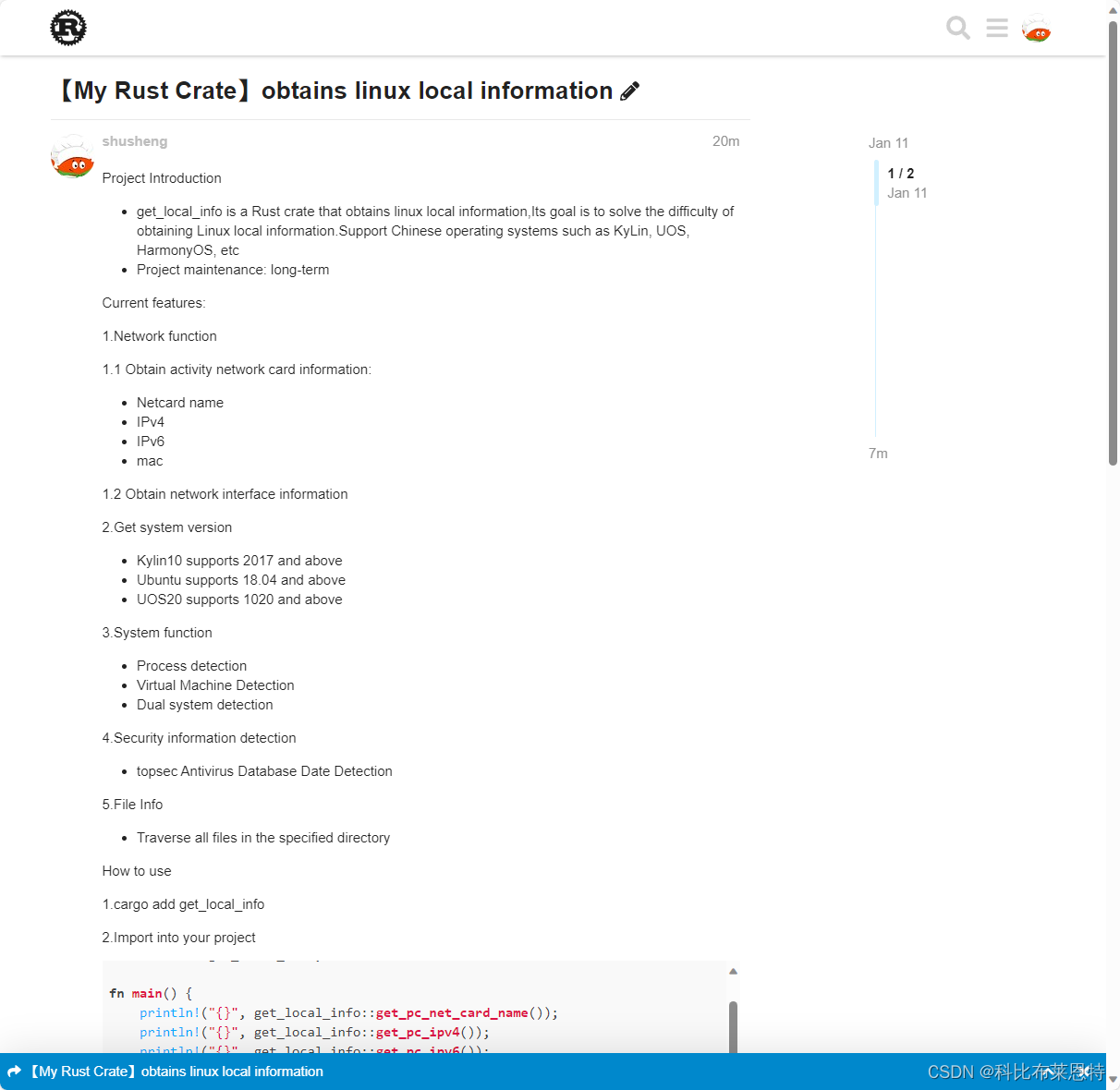STM32存储左右互搏 SPI总线FATS读写FRAM MB85RS2M
在中低容量存储领域,除了FLASH的使用,,还有铁电存储器FRAM的使用,相对于FLASH,FRAM写操作时不需要预擦除,所以执行写操作时可以达到更高的速度,其主要优点为没有FLASH持续写操作跨页地址需要变换的要求。相比于SRAM则具有非易失性, 因此价格方面会高一些。MB85RS2M是256K Byte(2M bit)的FRAM,能够按字节进行写入且没有写入等待时间。其管脚功能兼容FLASH: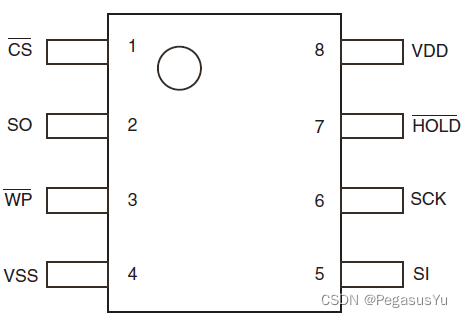
这里介绍STM32 FATS文件操作方式访问FRAM MB85RS2M的例程。采用STM32CUBEIDE开发平台,以STM32F401CCU6芯片为例,通过STM32 SPI硬件电路实现读写操作,通过USB虚拟串口进行控制。
STM32工程配置
首先建立基本工程并设置时钟:
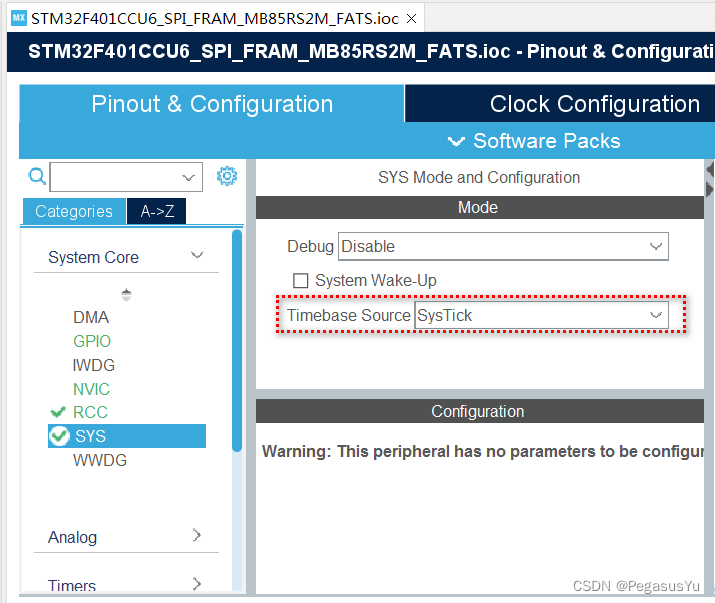
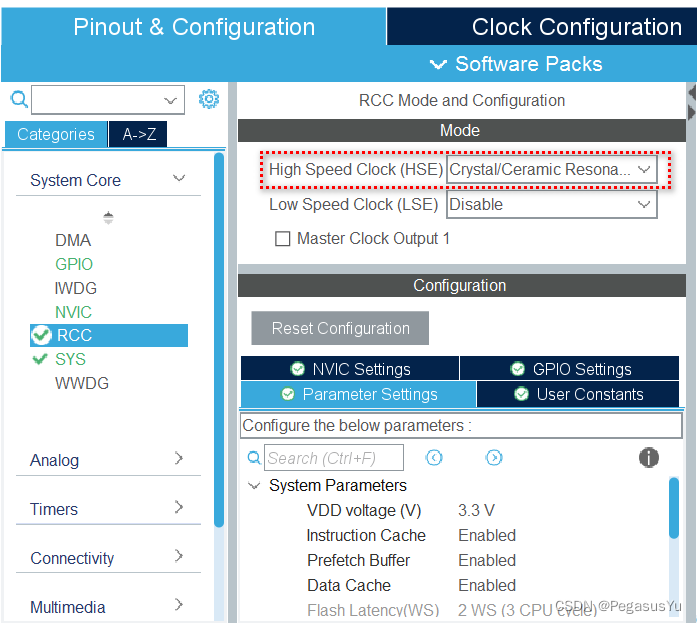
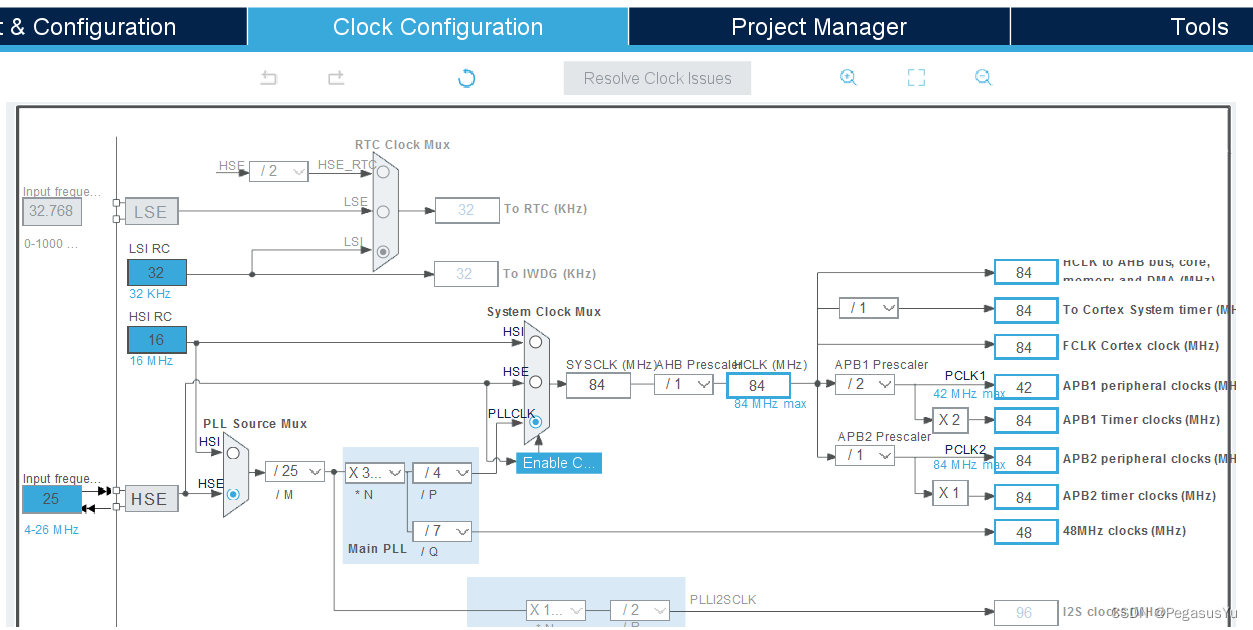
配置硬件SPI接口:
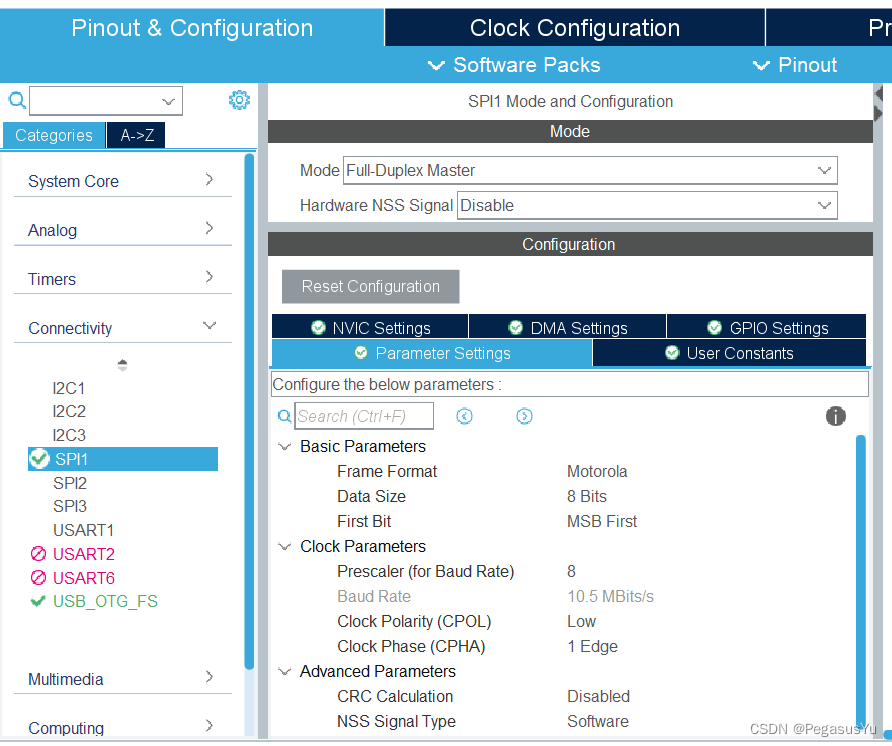
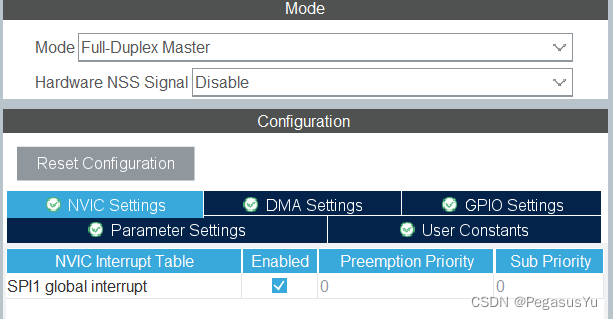
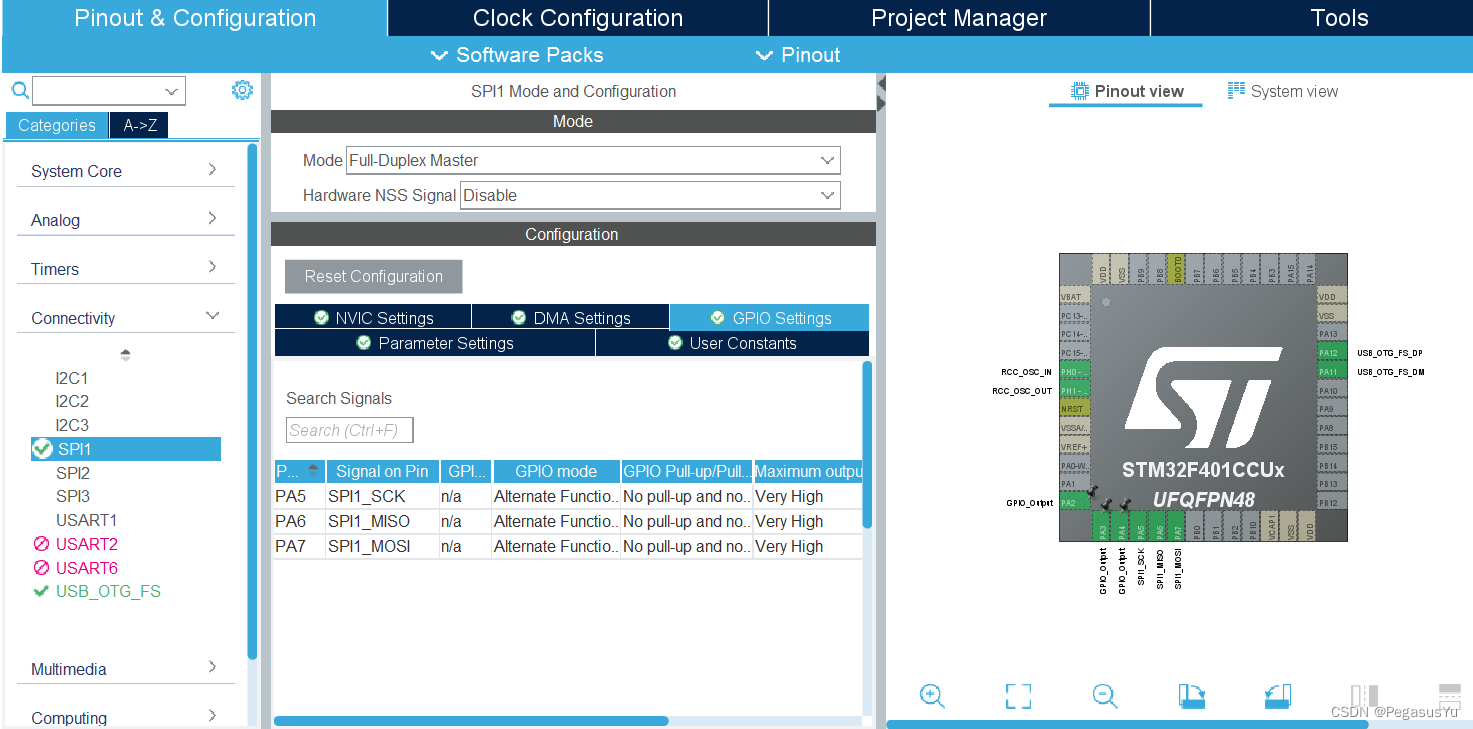
增加配置PA4作为SPI软件代码控制输出的片选管脚
并增加PA2和PA3连接到/WP和/HOLD管脚,并保持输出高电平:
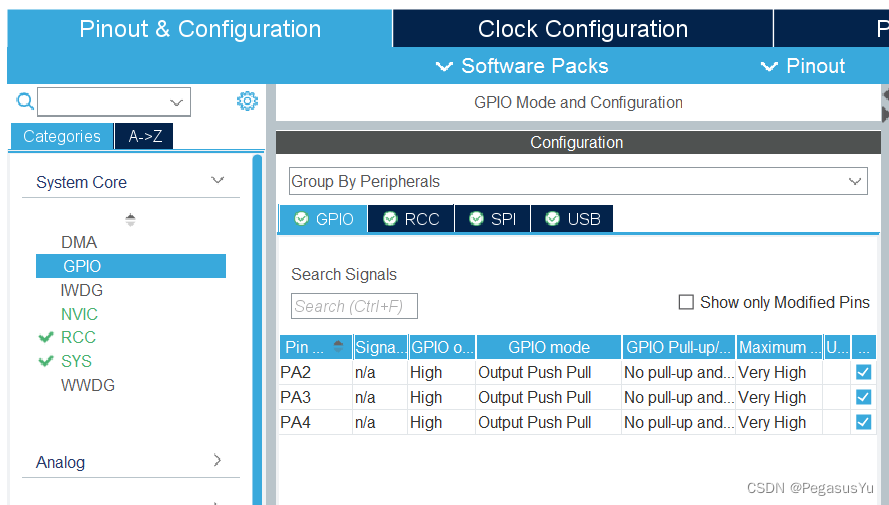
配置USB作为通讯口:
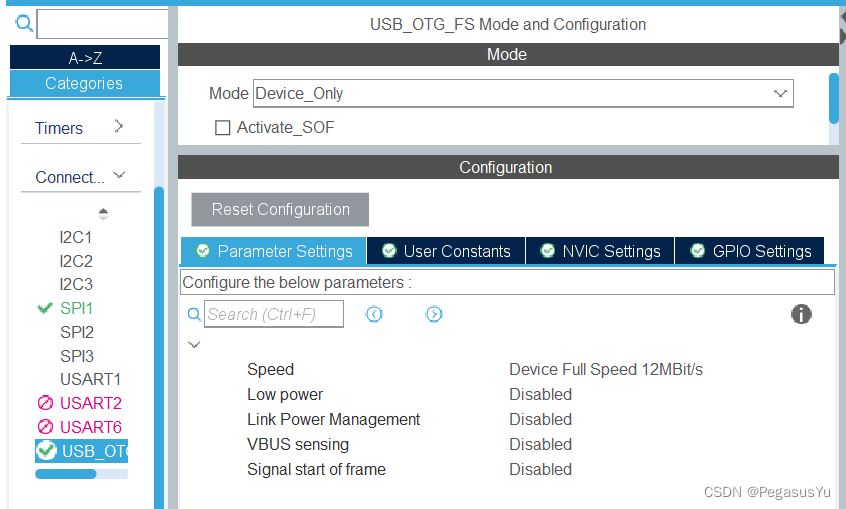
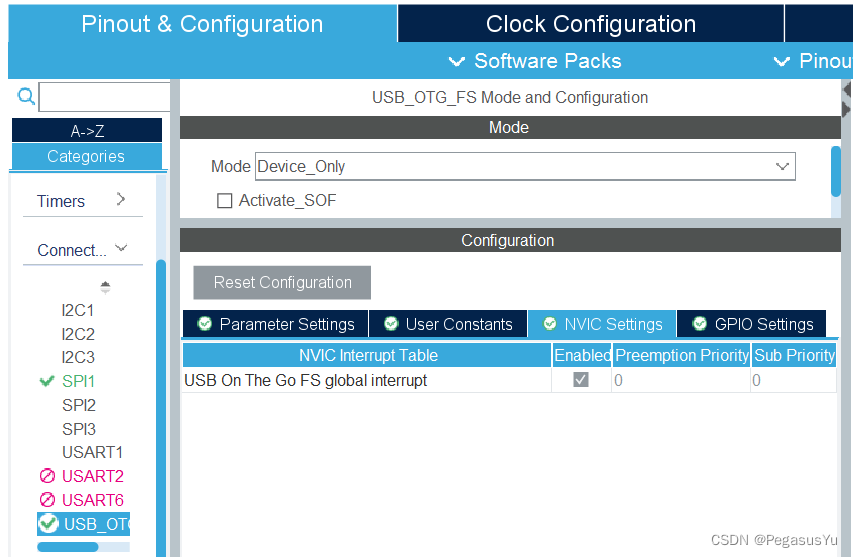
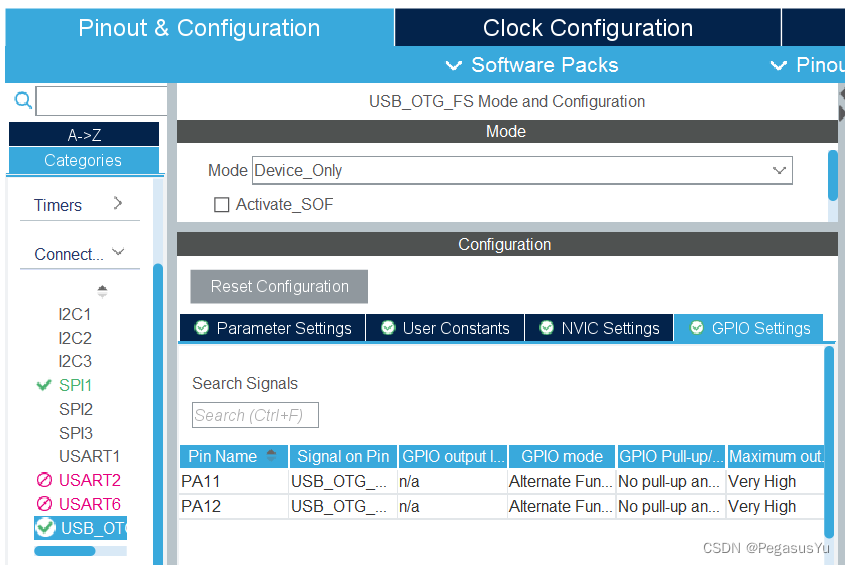
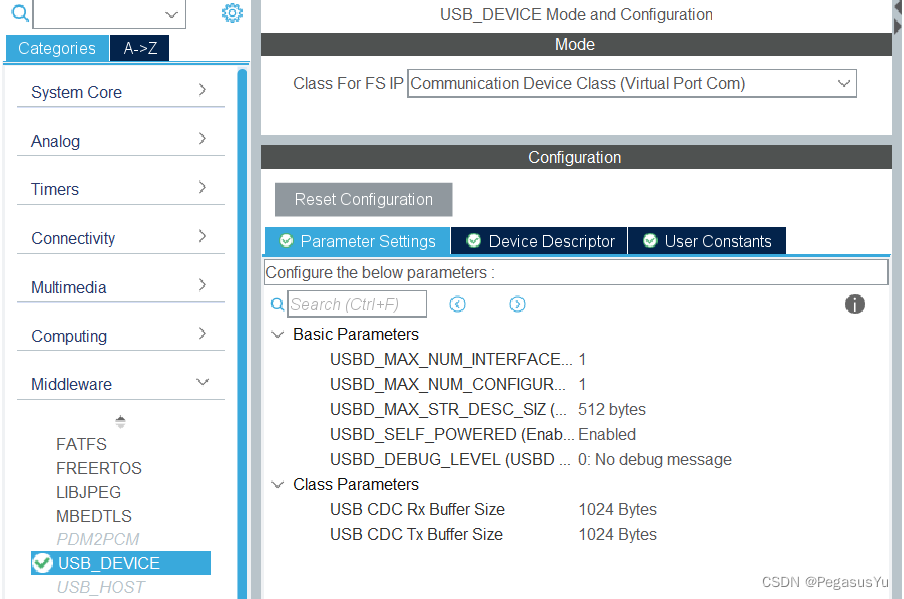

对FATS文件系统进行配置:
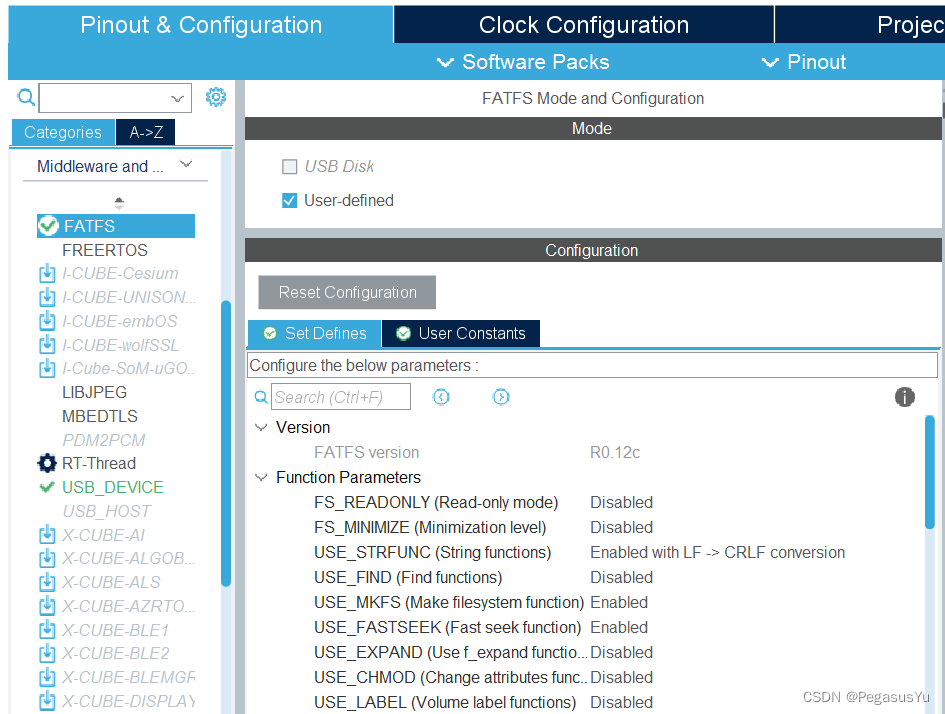
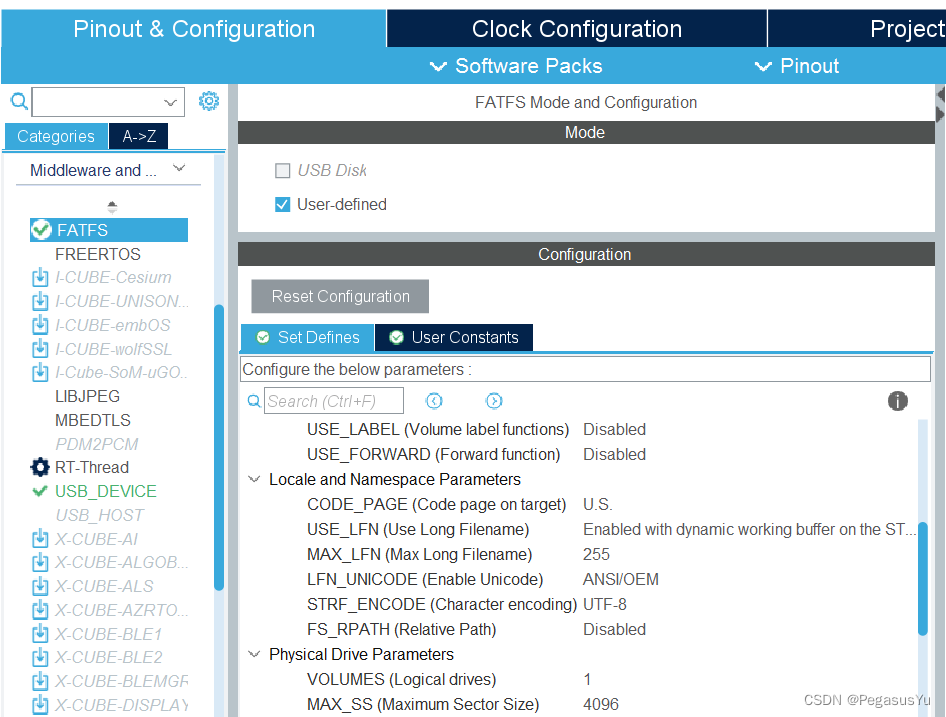
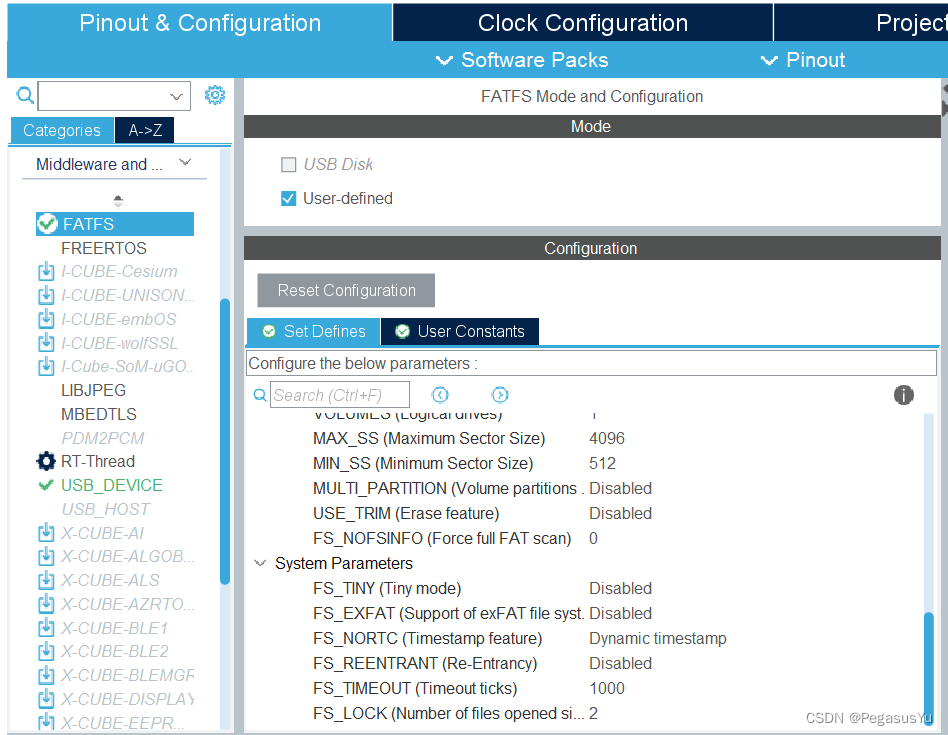
保存并生成初始工程代码:
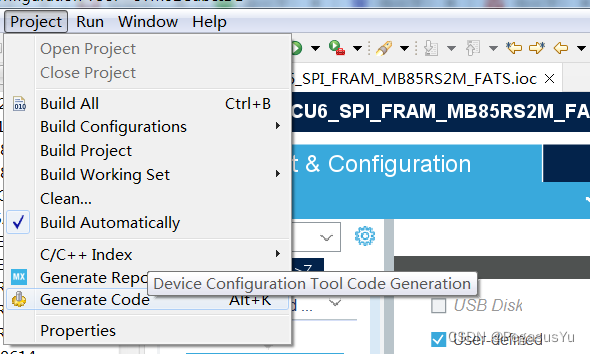
STM32工程代码
USB虚拟串口的使用参考:STM32 USB VCOM和HID的区别,配置及Echo功能实现(HAL)
代码里用到的微秒延时函数参考: STM32 HAL us delay(微秒延时)的指令延时实现方式及优化
建立MB85RS2M.h头文件:
#ifndef INC_MB85RS2M_H_
#define INC_MB85RS2M_H_
#include "main.h"
/*To define operation code*/
#define WREN 0x06 //Set Write Enable Latch
#define WRDI 0x04 //Reset Write Enable Latch
#define RDSR 0x05 //Read Status Register
#define WRSR 0x01 //Write Status Register
#define READ 0x03 //Read Memory Code
#define WRITE 0x02 //Write Memory Code
#define RDID 0x9F //Read Device ID
#define MB85RS2M_ID 0x03487F04
uint32_t MB85RS2M_ReadID(void);
uint8_t MB85RS2M_Init(void);
void MB85RS2M_Set_Write_Enable_Latch(void);
void MB85RS2M_Reset_Write_Enable_Latch(void);
void MB85RS2M_Write_Status_Register(uint8_t SRV);
uint8_t MB85RS2M_Read_Status_Register(void);
void MB85RS2M_Write_Memory(uint8_t * wd, uint32_t addr, uint32_t len);
void MB85RS2M_Read_Memory(uint8_t * rd, uint32_t addr, uint32_t len);
#endif /* INC_MB85RS2M_H_ */
建立MB85RS2M.c源文件:
//Written by Pegasus Yu in 2023
#include "MB85RS2M.h"
#include <string.h>
#define SPI1_CS_L HAL_GPIO_WritePin(GPIOA, GPIO_PIN_4, GPIO_PIN_RESET)
#define SPI1_CS_H HAL_GPIO_WritePin(GPIOA, GPIO_PIN_4, GPIO_PIN_SET)
extern SPI_HandleTypeDef hspi1;
extern void PY_Delay_us_t(uint32_t Delay);
uint32_t MB85RS2M_ReadID(void)
{
uint8_t ftd[5];
uint8_t frd[5];
uint8_t Manufacturer_ID;
uint8_t Continuation_Code;
uint8_t Product_ID_L;
uint8_t Product_ID_H;
ftd[0]=RDID;
SPI1_CS_L;
HAL_SPI_TransmitReceive(&hspi1, ftd, frd, 5, 0xFFFFFFFF);
SPI1_CS_H;
Manufacturer_ID = frd[1];
Continuation_Code = frd[2];
Product_ID_L = frd[3];
Product_ID_H = frd[4];
return ((Product_ID_H<<24)|(Product_ID_L<<16)|(Continuation_Code<<8)|(Manufacturer_ID));
}
uint8_t MB85RS2M_Init(void)
{
uint8_t st = 0;
for(uint8_t i=0; i<4; i++)
{
if(MB85RS2M_ReadID()==MB85RS2M_ID)
{
st = 1;
break;
}
}
return st;
}
/*
* WEL is reset after the following operations which means every write operation must follow once WREN operation MB85RS2M_Set_Write_Enable_Latch().
* After power ON.
* After WRDI command recognition.
* At the rising edge of CS after WRSR command recognition.
* At the rising edge of CS after WRITE command recognition.
*/
void MB85RS2M_Set_Write_Enable_Latch(void)
{
uint8_t cmd = WREN;
SPI1_CS_L;
HAL_SPI_Transmit(&hspi1, &cmd, 1, 0xFFFFFFFF);
SPI1_CS_H;
}
void MB85RS2M_Reset_Write_Enable_Latch(void)
{
uint8_t cmd = WRDI;
SPI1_CS_L;
HAL_SPI_Transmit(&hspi1, &cmd, 1, 0xFFFFFFFF);
SPI1_CS_H;
}
void MB85RS2M_Write_Status_Register(uint8_t SRV)
{
uint8_t data[2];
data[0] = WRSR;
data[1] = SRV;
MB85RS2M_Set_Write_Enable_Latch();
PY_Delay_us_t(2);
SPI1_CS_L;
HAL_SPI_Transmit(&hspi1, data, 2, 0xFFFFFFFF);
SPI1_CS_H;
}
uint8_t MB85RS2M_Read_Status_Register(void)
{
uint8_t cmd[2];
uint8_t data[2];
uint8_t SRV;
cmd[0] = RDSR;
SPI1_CS_L;
HAL_SPI_TransmitReceive(&hspi1, cmd, data, 2, 0xFFFFFFFF);
SPI1_CS_H;
SRV = data[1];
return SRV;
}
/*
* wd: data buffer pointer
* addr: address to operate for MB85RS2M
* len: data length to be written
*/
void MB85RS2M_Write_Memory(uint8_t * wd, uint32_t addr, uint32_t len)
{
uint8_t data[len+4];
data[0] = WRITE;
data[1] = (uint8_t)(addr>>16);
data[2] = (uint8_t)(addr>>8);
data[3] = (uint8_t)addr;
memcpy(data+4, wd, len);
MB85RS2M_Set_Write_Enable_Latch();
PY_Delay_us_t(2);
SPI1_CS_L;
HAL_SPI_Transmit(&hspi1, data, len+4, 0xFFFFFFFF);
SPI1_CS_H;
}
/*
* rd: data buffer pointer
* addr: address to operate for MB85RS2M
* len: data length to be written
*/
void MB85RS2M_Read_Memory(uint8_t * rd, uint32_t addr, uint32_t len)
{
uint8_t cmd[len+4];
uint8_t data[len+4];
cmd[0] = READ;
cmd[1] = (uint8_t)(addr>>16);
cmd[2] = (uint8_t)(addr>>8);
cmd[3] = (uint8_t)addr;
SPI1_CS_L;
HAL_SPI_TransmitReceive(&hspi1, cmd, data , len+4, 0xFFFFFFFF);
SPI1_CS_H;
memcpy(rd, data+4, len);
}
USB接收命令的代码:

static int8_t CDC_Receive_FS(uint8_t* Buf, uint32_t *Len)
{
/* USER CODE BEGIN 6 */
extern uint8_t cmd;
cmd = Buf[0];
USBD_CDC_SetRxBuffer(&hUsbDeviceFS, &Buf[0]);
USBD_CDC_ReceivePacket(&hUsbDeviceFS);
return (USBD_OK);
/* USER CODE END 6 */
}
对ffconf.h添加包含信息:

#include "main.h"
#include "stm32f4xx_hal.h"
#include "MB85RS2M.h"
修改user_diskio.c,对文件操作函数与底层I2C读写提供连接:
/* USER CODE BEGIN Header */
/**
******************************************************************************
* @file user_diskio.c
* @brief This file includes a diskio driver skeleton to be completed by the user.
******************************************************************************
* @attention
*
* Copyright (c) 2023 STMicroelectronics.
* All rights reserved.
*
* This software is licensed under terms that can be found in the LICENSE file
* in the root directory of this software component.
* If no LICENSE file comes with this software, it is provided AS-IS.
*
******************************************************************************
*/
/* USER CODE END Header */
#ifdef USE_OBSOLETE_USER_CODE_SECTION_0
/*
* Warning: the user section 0 is no more in use (starting from CubeMx version 4.16.0)
* To be suppressed in the future.
* Kept to ensure backward compatibility with previous CubeMx versions when
* migrating projects.
* User code previously added there should be copied in the new user sections before
* the section contents can be deleted.
*/
/* USER CODE BEGIN 0 */
/* USER CODE END 0 */
#endif
/* USER CODE BEGIN DECL */
/* Includes ------------------------------------------------------------------*/
#include <string.h>
#include "ff_gen_drv.h"
/* Private typedef -----------------------------------------------------------*/
/* Private define ------------------------------------------------------------*/
/* Private variables ---------------------------------------------------------*/
/* Disk status */
static volatile DSTATUS Stat = STA_NOINIT;
/* USER CODE END DECL */
/* Private function prototypes -----------------------------------------------*/
DSTATUS USER_initialize (BYTE pdrv);
DSTATUS USER_status (BYTE pdrv);
DRESULT USER_read (BYTE pdrv, BYTE *buff, DWORD sector, UINT count);
#if _USE_WRITE == 1
DRESULT USER_write (BYTE pdrv, const BYTE *buff, DWORD sector, UINT count);
#endif /* _USE_WRITE == 1 */
#if _USE_IOCTL == 1
DRESULT USER_ioctl (BYTE pdrv, BYTE cmd, void *buff);
#endif /* _USE_IOCTL == 1 */
Diskio_drvTypeDef USER_Driver =
{
USER_initialize,
USER_status,
USER_read,
#if _USE_WRITE
USER_write,
#endif /* _USE_WRITE == 1 */
#if _USE_IOCTL == 1
USER_ioctl,
#endif /* _USE_IOCTL == 1 */
};
/* Private functions ---------------------------------------------------------*/
/**
* @brief Initializes a Drive
* @param pdrv: Physical drive number (0..)
* @retval DSTATUS: Operation status
*/
DSTATUS USER_initialize (
BYTE pdrv /* Physical drive nmuber to identify the drive */
)
{
/* USER CODE BEGIN INIT */
/**************************SELF DEFINITION PART************/
uint8_t res;
res = MB85RS2M_Init();
if(res) return RES_OK;
else return STA_NOINIT;
/**********************************************************/
/*
Stat = STA_NOINIT;
return Stat;
*/
/* USER CODE END INIT */
}
/**
* @brief Gets Disk Status
* @param pdrv: Physical drive number (0..)
* @retval DSTATUS: Operation status
*/
DSTATUS USER_status (
BYTE pdrv /* Physical drive number to identify the drive */
)
{
/* USER CODE BEGIN STATUS */
/**************************SELF DEFINITION PART************/
switch (pdrv)
{
case 0 :
return RES_OK;
case 1 :
return RES_OK;
case 2 :
return RES_OK;
default:
return STA_NOINIT;
}
/**********************************************************/
/*
Stat = STA_NOINIT;
return Stat;
*/
/* USER CODE END STATUS */
}
/**
* @brief Reads Sector(s)
* @param pdrv: Physical drive number (0..)
* @param *buff: Data buffer to store read data
* @param sector: Sector address (LBA)
* @param count: Number of sectors to read (1..128)
* @retval DRESULT: Operation result
*/
DRESULT USER_read (
BYTE pdrv, /* Physical drive nmuber to identify the drive */
BYTE *buff, /* Data buffer to store read data */
DWORD sector, /* Sector address in LBA */
UINT count /* Number of sectors to read */
)
{
/* USER CODE BEGIN READ */
/**************************SELF DEFINITION PART************/
uint16_t len;
if( !count )
{
return RES_PARERR; /* count不能等于0,否则返回参数错误*/
}
switch (pdrv)
{
case 0:
sector <<= 9; //Convert sector number to byte address
len = count*512;
MB85RS2M_Read_Memory((uint8_t *)buff, sector, len);
return RES_OK;
default:
return RES_ERROR;
}
/**********************************************************/
/*
return RES_OK;
*/
/* USER CODE END READ */
}
/**
* @brief Writes Sector(s)
* @param pdrv: Physical drive number (0..)
* @param *buff: Data to be written
* @param sector: Sector address (LBA)
* @param count: Number of sectors to write (1..128)
* @retval DRESULT: Operation result
*/
#if _USE_WRITE == 1
DRESULT USER_write (
BYTE pdrv, /* Physical drive nmuber to identify the drive */
const BYTE *buff, /* Data to be written */
DWORD sector, /* Sector address in LBA */
UINT count /* Number of sectors to write */
)
{
/* USER CODE BEGIN WRITE */
/* USER CODE HERE */
/**************************SELF DEFINITION PART************/
uint16_t len;
if( !count )
{
return RES_PARERR; /* count不能等于0,否则返回参数错误*/
}
switch (pdrv)
{
case 0:
sector <<= 9; //Convert sector number to byte address
len = count*512;
MB85RS2M_Write_Memory((uint8_t *)buff, sector, len);
return RES_OK;
default:
return RES_ERROR;
}
/**********************************************************/
/*
return RES_OK;
*/
/* USER CODE END WRITE */
}
#endif /* _USE_WRITE == 1 */
/**
* @brief I/O control operation
* @param pdrv: Physical drive number (0..)
* @param cmd: Control code
* @param *buff: Buffer to send/receive control data
* @retval DRESULT: Operation result
*/
#if _USE_IOCTL == 1
DRESULT USER_ioctl (
BYTE pdrv, /* Physical drive nmuber (0..) */
BYTE cmd, /* Control code */
void *buff /* Buffer to send/receive control data */
)
{
/* USER CODE BEGIN IOCTL */
/**************************SELF DEFINITION PART************/
#define user_sector_byte_size 512
DRESULT res;
switch(cmd)
{
case CTRL_SYNC:
res=RES_OK;
break;
case GET_SECTOR_SIZE:
*(WORD*)buff = user_sector_byte_size;
res = RES_OK;
break;
case GET_BLOCK_SIZE:
*(WORD*)buff = 4096/user_sector_byte_size;
res = RES_OK;
break;
case GET_SECTOR_COUNT:
*(DWORD*)buff = (256*1024/512);
res = RES_OK;
break;
default:
res = RES_PARERR;
break;
}
return res;
/**********************************************************/
/*
DRESULT res = RES_ERROR;
return res;
*/
/* USER CODE END IOCTL */
}
#endif /* _USE_IOCTL == 1 */
然后在main.c里根据串口输入命令(16进制单字节)实现如下功能:
0x01. 读取FRAM ID
0x02. 装载FATS文件系统
0x03: 创建/打开文件并从头位置写入数据
0x04: 打开文件并从头位置读入数据
0x05: 创建/打开文件并从特定位置写入数据
0x06: 打开文件并从特定位置读入数据
完整的代码实现如下:
/* USER CODE BEGIN Header */
/**
******************************************************************************
* @file : main.c
* @brief : Main program body
******************************************************************************
* @attention
*
* Copyright (c) 2023 STMicroelectronics.
* All rights reserved.
*
* This software is licensed under terms that can be found in the LICENSE file
* in the root directory of this software component.
* If no LICENSE file comes with this software, it is provided AS-IS.
*
******************************************************************************
*/
//Written by Pegasus Yu in 2023
/* USER CODE END Header */
/* Includes ------------------------------------------------------------------*/
#include "main.h"
#include "fatfs.h"
#include "usb_device.h"
/* Private includes ----------------------------------------------------------*/
/* USER CODE BEGIN Includes */
#include <string.h>
#include "MB85RS2M.h"
/* USER CODE END Includes */
/* Private typedef -----------------------------------------------------------*/
/* USER CODE BEGIN PTD */
uint8_t CDC_Transmit_FS(uint8_t* Buf, uint16_t Len);
/* USER CODE END PTD */
/* Private define ------------------------------------------------------------*/
/* USER CODE BEGIN PD */
__IO float usDelayBase;
void PY_usDelayTest(void)
{
__IO uint32_t firstms, secondms;
__IO uint32_t counter = 0;
firstms = HAL_GetTick()+1;
secondms = firstms+1;
while(uwTick!=firstms) ;
while(uwTick!=secondms) counter++;
usDelayBase = ((float)counter)/1000;
}
void PY_Delay_us_t(uint32_t Delay)
{
__IO uint32_t delayReg;
__IO uint32_t usNum = (uint32_t)(Delay*usDelayBase);
delayReg = 0;
while(delayReg!=usNum) delayReg++;
}
void PY_usDelayOptimize(void)
{
__IO uint32_t firstms, secondms;
__IO float coe = 1.0;
firstms = HAL_GetTick();
PY_Delay_us_t(1000000) ;
secondms = HAL_GetTick();
coe = ((float)1000)/(secondms-firstms);
usDelayBase = coe*usDelayBase;
}
void PY_Delay_us(uint32_t Delay)
{
__IO uint32_t delayReg;
__IO uint32_t msNum = Delay/1000;
__IO uint32_t usNum = (uint32_t)((Delay%1000)*usDelayBase);
if(msNum>0) HAL_Delay(msNum);
delayReg = 0;
while(delayReg!=usNum) delayReg++;
}
/* USER CODE END PD */
/* Private macro -------------------------------------------------------------*/
/* USER CODE BEGIN PM */
/* USER CODE END PM */
/* Private variables ---------------------------------------------------------*/
SPI_HandleTypeDef hspi1;
/* USER CODE BEGIN PV */
/* USER CODE END PV */
/* Private function prototypes -----------------------------------------------*/
void SystemClock_Config(void);
static void MX_GPIO_Init(void);
static void MX_SPI1_Init(void);
/* USER CODE BEGIN PFP */
/* USER CODE END PFP */
/* Private user code ---------------------------------------------------------*/
/* USER CODE BEGIN 0 */
uint8_t cmd=0; //for status control
uint8_t FRAM_mount_status = 0; //FRAM fats mount status indication (0: unmount; 1: mount)
uint8_t FATS_Buff[_MAX_SS]; //Buffer for f_mkfs() operation
FRESULT retFRAM;
FIL file;
FATFS *fs;
UINT bytesread;
UINT byteswritten;
uint8_t rBuffer[20]; //Buffer for read
uint8_t WBuffer[20] ={1,2,3,4,5,6,7,8,9,10,11,12,13,14,15,16,17,18,19,20}; //Buffer for write
#define user_sector_byte_size 512
uint8_t FRAMbuffer[user_sector_byte_size];
extern char USERPath[4];
char * console;
/* USER CODE END 0 */
/**
* @brief The application entry point.
* @retval int
*/
int main(void)
{
/* USER CODE BEGIN 1 */
FRAM_mount_status = 0;
uint32_t FRAM_Read_Size;
extern char USERPath[4];
char * dpath = "0:"; //Disk Path
for(uint8_t i=0; i<4; i++)
{
USERPath[i] = *(dpath+i);
}
const TCHAR* filepath = "0:test.txt";
char cchar[256];
console = cchar;
/* USER CODE END 1 */
/* MCU Configuration--------------------------------------------------------*/
/* Reset of all peripherals, Initializes the Flash interface and the Systick. */
HAL_Init();
/* USER CODE BEGIN Init */
/* USER CODE END Init */
/* Configure the system clock */
SystemClock_Config();
/* USER CODE BEGIN SysInit */
/* USER CODE END SysInit */
/* Initialize all configured peripherals */
MX_GPIO_Init();
MX_USB_DEVICE_Init();
MX_SPI1_Init();
MX_FATFS_Init();
/* USER CODE BEGIN 2 */
PY_usDelayTest();
PY_usDelayOptimize();
/* USER CODE END 2 */
/* Infinite loop */
/* USER CODE BEGIN WHILE */
while (1)
{
if(cmd==1) //Read ID
{
cmd = 0;
sprintf(console, "FRAM ID=MB85RS2MT\r\n\r\n");
while( CDC_Transmit_FS((uint8_t*)console, strlen(console)) == USBD_BUSY ) PY_Delay_us_t(1);
}
else if(cmd==2) //FRAM File System Mount
{
cmd = 0;
retFRAM=f_mount(&USERFatFS, (TCHAR const*)USERPath, 1);
if (retFRAM != FR_OK)
{
sprintf(console, "File system mount failure: %d\r\n", retFRAM);
while( CDC_Transmit_FS((uint8_t*)console, strlen(console)) == USBD_BUSY ) PY_Delay_us_t(1);
if(retFRAM==FR_NO_FILESYSTEM)
{
sprintf(console, "No file system. Now to format......\r\n");
while( CDC_Transmit_FS((uint8_t*)console, strlen(console)) == USBD_BUSY ) PY_Delay_us_t(1);
retFRAM = f_mkfs((TCHAR const*)USERPath, FM_FAT, 1024, FATS_Buff, sizeof(FATS_Buff)); //FRAM formatting
if(retFRAM == FR_OK)
{
sprintf(console, "FRAM formatting success!\r\n");
while( CDC_Transmit_FS((uint8_t*)console, strlen(console)) == USBD_BUSY ) PY_Delay_us_t(1);
}
else
{
sprintf(console, "FRAM formatting failure!\r\n");
while( CDC_Transmit_FS((uint8_t*)console, strlen(console)) == USBD_BUSY ) PY_Delay_us_t(1);
}
}
}
else
{
FRAM_mount_status = 1;
sprintf(console, "File system mount success\r\n");
while( CDC_Transmit_FS((uint8_t*)console, strlen(console)) == USBD_BUSY ) PY_Delay_us_t(1);
}
}
else if(cmd==3) //File creation and write
{
cmd = 0;
if(FRAM_mount_status==0)
{
sprintf(console, "\r\nFRAM File system not mounted: %d\r\n",retFRAM);
while( CDC_Transmit_FS((uint8_t*)console, strlen(console)) == USBD_BUSY ) PY_Delay_us_t(1);
}
else
{
retFRAM = f_open( &file, filepath, FA_CREATE_ALWAYS | FA_WRITE ); //Open or create file
if(retFRAM == FR_OK)
{
sprintf(console, "\r\nFile open or creation successful\r\n");
while( CDC_Transmit_FS((uint8_t*)console, strlen(console)) == USBD_BUSY ) PY_Delay_us_t(1);
retFRAM = f_write( &file, (const void *)WBuffer, sizeof(WBuffer), &byteswritten); //Write data
if(retFRAM == FR_OK)
{
sprintf(console, "\r\nFile write successful\r\n");
while( CDC_Transmit_FS((uint8_t*)console, strlen(console)) == USBD_BUSY ) PY_Delay_us_t(1);
}
else
{
sprintf(console, "\r\nFile write error: %d\r\n",retFRAM);
while( CDC_Transmit_FS((uint8_t*)console, strlen(console)) == USBD_BUSY ) PY_Delay_us_t(1);
}
f_close(&file); //Close file
}
else
{
sprintf(console, "\r\nFile open or creation error %d\r\n",retFRAM);
while( CDC_Transmit_FS((uint8_t*)console, strlen(console)) == USBD_BUSY ) PY_Delay_us_t(1);
}
}
}
else if(cmd==4) //File read
{
cmd = 0;
if(FRAM_mount_status==0)
{
sprintf(console, "\r\nFRAM File system not mounted: %d\r\n",retFRAM);
while( CDC_Transmit_FS((uint8_t*)console, strlen(console)) == USBD_BUSY ) PY_Delay_us_t(1);
}
else
{
retFRAM = f_open( &file, filepath, FA_OPEN_EXISTING | FA_READ); //Open file
if(retFRAM == FR_OK)
{
sprintf(console, "\r\nFile open successful\r\n");
while( CDC_Transmit_FS((uint8_t*)console, strlen(console)) == USBD_BUSY ) PY_Delay_us_t(1);
retFRAM = f_read( &file, (void *)rBuffer, sizeof(rBuffer), &bytesread); //Read data
if(retFRAM == FR_OK)
{
sprintf(console, "\r\nFile read successful\r\n");
while( CDC_Transmit_FS((uint8_t*)console, strlen(console)) == USBD_BUSY ) PY_Delay_us_t(1);
PY_Delay_us_t(200000);
FRAM_Read_Size = sizeof(rBuffer);
for(uint16_t i = 0;i < FRAM_Read_Size;i++)
{
sprintf(console, "%d ", rBuffer[i]);
while( CDC_Transmit_FS((uint8_t*)console, strlen(console)) == USBD_BUSY ) PY_Delay_us_t(1);
}
sprintf(console, "\r\n");
while( CDC_Transmit_FS((uint8_t*)console, strlen(console)) == USBD_BUSY ) PY_Delay_us_t(1);
}
else
{
sprintf(console, "\r\nFile read error: %d\r\n", retFRAM);
while( CDC_Transmit_FS((uint8_t*)console, strlen(console)) == USBD_BUSY ) PY_Delay_us_t(1);
}
f_close(&file); //Close file
}
else
{
sprintf(console, "\r\nFile open error: %d\r\n", retFRAM);
while( CDC_Transmit_FS((uint8_t*)console, strlen(console)) == USBD_BUSY ) PY_Delay_us_t(1);
}
}
}
else if(cmd==5) //File locating write
{
cmd = 0;
if(FRAM_mount_status==0)
{
sprintf(console, "\r\nFRAM File system not mounted: %d\r\n",retFRAM);
while( CDC_Transmit_FS((uint8_t*)console, strlen(console)) == USBD_BUSY ) PY_Delay_us_t(1);
}
else
{
retFRAM = f_open( &file, filepath, FA_CREATE_ALWAYS | FA_WRITE); //Open or create file
if(retFRAM == FR_OK)
{
sprintf(console, "\r\nFile open or creation successful\r\n");
while( CDC_Transmit_FS((uint8_t*)console, strlen(console)) == USBD_BUSY ) PY_Delay_us_t(1);
retFRAM=f_lseek( &file, f_tell(&file) + sizeof(WBuffer) ); //move file operation pointer, f_tell(&file) gets file head locating
if(retFRAM == FR_OK)
{
retFRAM = f_write( &file, (const void *)WBuffer, sizeof(WBuffer), &byteswritten);
if(retFRAM == FR_OK)
{
sprintf(console, "\r\nFile locating write successful\r\n");
while( CDC_Transmit_FS((uint8_t*)console, strlen(console)) == USBD_BUSY ) PY_Delay_us_t(1);
}
else
{
sprintf(console, "\r\nFile locating write error: %d\r\n", retFRAM);
while( CDC_Transmit_FS((uint8_t*)console, strlen(console)) == USBD_BUSY ) PY_Delay_us_t(1);
}
}
else
{
sprintf(console, "\r\nFile pointer error: %d\r\n",retFRAM);
while( CDC_Transmit_FS((uint8_t*)console, strlen(console)) == USBD_BUSY ) PY_Delay_us_t(1);
}
f_close(&file); //Close file
}
else
{
sprintf(console, "\r\nFile open or creation error %d\r\n",retFRAM);
while( CDC_Transmit_FS((uint8_t*)console, strlen(console)) == USBD_BUSY ) PY_Delay_us_t(1);
}
}
}
else if(cmd==6) //File locating read
{
cmd = 0;
if(FRAM_mount_status==0)
{
sprintf(console, "\r\nFRAM File system not mounted: %d\r\n",retFRAM);
while( CDC_Transmit_FS((uint8_t*)console, strlen(console)) == USBD_BUSY ) PY_Delay_us_t(1);
}
else
{
retFRAM = f_open(&file, filepath, FA_OPEN_EXISTING | FA_READ); //Open file
if(retFRAM == FR_OK)
{
sprintf(console, "\r\nFile open successful\r\n");
while( CDC_Transmit_FS((uint8_t*)console, strlen(console)) == USBD_BUSY ) PY_Delay_us_t(1);
retFRAM = f_lseek(&file,f_tell(&file)+ sizeof(WBuffer)/2); //move file operation pointer, f_tell(&file) gets file head locating
if(retFRAM == FR_OK)
{
retFRAM = f_read( &file, (void *)rBuffer, sizeof(rBuffer), &bytesread);
if(retFRAM == FR_OK)
{
sprintf(console, "\r\nFile locating read successful\r\n");
while( CDC_Transmit_FS((uint8_t*)console, strlen(console)) == USBD_BUSY ) PY_Delay_us_t(1);
PY_Delay_us_t(200000);
FRAM_Read_Size = sizeof(rBuffer);
for(uint16_t i = 0;i < FRAM_Read_Size;i++)
{
sprintf(console, "%d ",rBuffer[i]);
while( CDC_Transmit_FS((uint8_t*)console, strlen(console)) == USBD_BUSY ) PY_Delay_us_t(1);
}
sprintf(console, "\r\n");
while( CDC_Transmit_FS((uint8_t*)console, strlen(console)) == USBD_BUSY ) PY_Delay_us_t(1);
}
else
{
sprintf(console, "\r\nFile locating read error: %d\r\n",retFRAM);
while( CDC_Transmit_FS((uint8_t*)console, strlen(console)) == USBD_BUSY ) PY_Delay_us_t(1);
}
}
else
{
sprintf(console, "\r\nFile pointer error: %d\r\n",retFRAM);
while( CDC_Transmit_FS((uint8_t*)console, strlen(console)) == USBD_BUSY ) PY_Delay_us_t(1);
}
f_close(&file);
}
else
{
sprintf(console, "\r\nFile open error: %d\r\n",retFRAM);
while( CDC_Transmit_FS((uint8_t*)console, strlen(console)) == USBD_BUSY ) PY_Delay_us_t(1);
}
}
}
PY_Delay_us_t(100);
/* USER CODE END WHILE */
/* USER CODE BEGIN 3 */
}
/* USER CODE END 3 */
}
/**
* @brief System Clock Configuration
* @retval None
*/
void SystemClock_Config(void)
{
RCC_OscInitTypeDef RCC_OscInitStruct = {0};
RCC_ClkInitTypeDef RCC_ClkInitStruct = {0};
/** Configure the main internal regulator output voltage
*/
__HAL_RCC_PWR_CLK_ENABLE();
__HAL_PWR_VOLTAGESCALING_CONFIG(PWR_REGULATOR_VOLTAGE_SCALE2);
/** Initializes the RCC Oscillators according to the specified parameters
* in the RCC_OscInitTypeDef structure.
*/
RCC_OscInitStruct.OscillatorType = RCC_OSCILLATORTYPE_HSE;
RCC_OscInitStruct.HSEState = RCC_HSE_ON;
RCC_OscInitStruct.PLL.PLLState = RCC_PLL_ON;
RCC_OscInitStruct.PLL.PLLSource = RCC_PLLSOURCE_HSE;
RCC_OscInitStruct.PLL.PLLM = 25;
RCC_OscInitStruct.PLL.PLLN = 336;
RCC_OscInitStruct.PLL.PLLP = RCC_PLLP_DIV4;
RCC_OscInitStruct.PLL.PLLQ = 7;
if (HAL_RCC_OscConfig(&RCC_OscInitStruct) != HAL_OK)
{
Error_Handler();
}
/** Initializes the CPU, AHB and APB buses clocks
*/
RCC_ClkInitStruct.ClockType = RCC_CLOCKTYPE_HCLK|RCC_CLOCKTYPE_SYSCLK
|RCC_CLOCKTYPE_PCLK1|RCC_CLOCKTYPE_PCLK2;
RCC_ClkInitStruct.SYSCLKSource = RCC_SYSCLKSOURCE_PLLCLK;
RCC_ClkInitStruct.AHBCLKDivider = RCC_SYSCLK_DIV1;
RCC_ClkInitStruct.APB1CLKDivider = RCC_HCLK_DIV2;
RCC_ClkInitStruct.APB2CLKDivider = RCC_HCLK_DIV1;
if (HAL_RCC_ClockConfig(&RCC_ClkInitStruct, FLASH_LATENCY_2) != HAL_OK)
{
Error_Handler();
}
}
/**
* @brief SPI1 Initialization Function
* @param None
* @retval None
*/
static void MX_SPI1_Init(void)
{
/* USER CODE BEGIN SPI1_Init 0 */
/* USER CODE END SPI1_Init 0 */
/* USER CODE BEGIN SPI1_Init 1 */
/* USER CODE END SPI1_Init 1 */
/* SPI1 parameter configuration*/
hspi1.Instance = SPI1;
hspi1.Init.Mode = SPI_MODE_MASTER;
hspi1.Init.Direction = SPI_DIRECTION_2LINES;
hspi1.Init.DataSize = SPI_DATASIZE_8BIT;
hspi1.Init.CLKPolarity = SPI_POLARITY_LOW;
hspi1.Init.CLKPhase = SPI_PHASE_1EDGE;
hspi1.Init.NSS = SPI_NSS_SOFT;
hspi1.Init.BaudRatePrescaler = SPI_BAUDRATEPRESCALER_8;
hspi1.Init.FirstBit = SPI_FIRSTBIT_MSB;
hspi1.Init.TIMode = SPI_TIMODE_DISABLE;
hspi1.Init.CRCCalculation = SPI_CRCCALCULATION_DISABLE;
hspi1.Init.CRCPolynomial = 10;
if (HAL_SPI_Init(&hspi1) != HAL_OK)
{
Error_Handler();
}
/* USER CODE BEGIN SPI1_Init 2 */
/* USER CODE END SPI1_Init 2 */
}
/**
* @brief GPIO Initialization Function
* @param None
* @retval None
*/
static void MX_GPIO_Init(void)
{
GPIO_InitTypeDef GPIO_InitStruct = {0};
/* USER CODE BEGIN MX_GPIO_Init_1 */
/* USER CODE END MX_GPIO_Init_1 */
/* GPIO Ports Clock Enable */
__HAL_RCC_GPIOH_CLK_ENABLE();
__HAL_RCC_GPIOA_CLK_ENABLE();
/*Configure GPIO pin Output Level */
HAL_GPIO_WritePin(GPIOA, GPIO_PIN_2|GPIO_PIN_3|GPIO_PIN_4, GPIO_PIN_SET);
/*Configure GPIO pins : PA2 PA3 PA4 */
GPIO_InitStruct.Pin = GPIO_PIN_2|GPIO_PIN_3|GPIO_PIN_4;
GPIO_InitStruct.Mode = GPIO_MODE_OUTPUT_PP;
GPIO_InitStruct.Pull = GPIO_NOPULL;
GPIO_InitStruct.Speed = GPIO_SPEED_FREQ_VERY_HIGH;
HAL_GPIO_Init(GPIOA, &GPIO_InitStruct);
/* USER CODE BEGIN MX_GPIO_Init_2 */
/* USER CODE END MX_GPIO_Init_2 */
}
/* USER CODE BEGIN 4 */
/* USER CODE END 4 */
/**
* @brief This function is executed in case of error occurrence.
* @retval None
*/
void Error_Handler(void)
{
/* USER CODE BEGIN Error_Handler_Debug */
/* User can add his own implementation to report the HAL error return state */
__disable_irq();
while (1)
{
}
/* USER CODE END Error_Handler_Debug */
}
#ifdef USE_FULL_ASSERT
/**
* @brief Reports the name of the source file and the source line number
* where the assert_param error has occurred.
* @param file: pointer to the source file name
* @param line: assert_param error line source number
* @retval None
*/
void assert_failed(uint8_t *file, uint32_t line)
{
/* USER CODE BEGIN 6 */
/* User can add his own implementation to report the file name and line number,
ex: printf("Wrong parameters value: file %s on line %d\r\n", file, line) */
/* USER CODE END 6 */
}
#endif /* USE_FULL_ASSERT */
STM32例程测试
串口指令0x01测试效果如下:
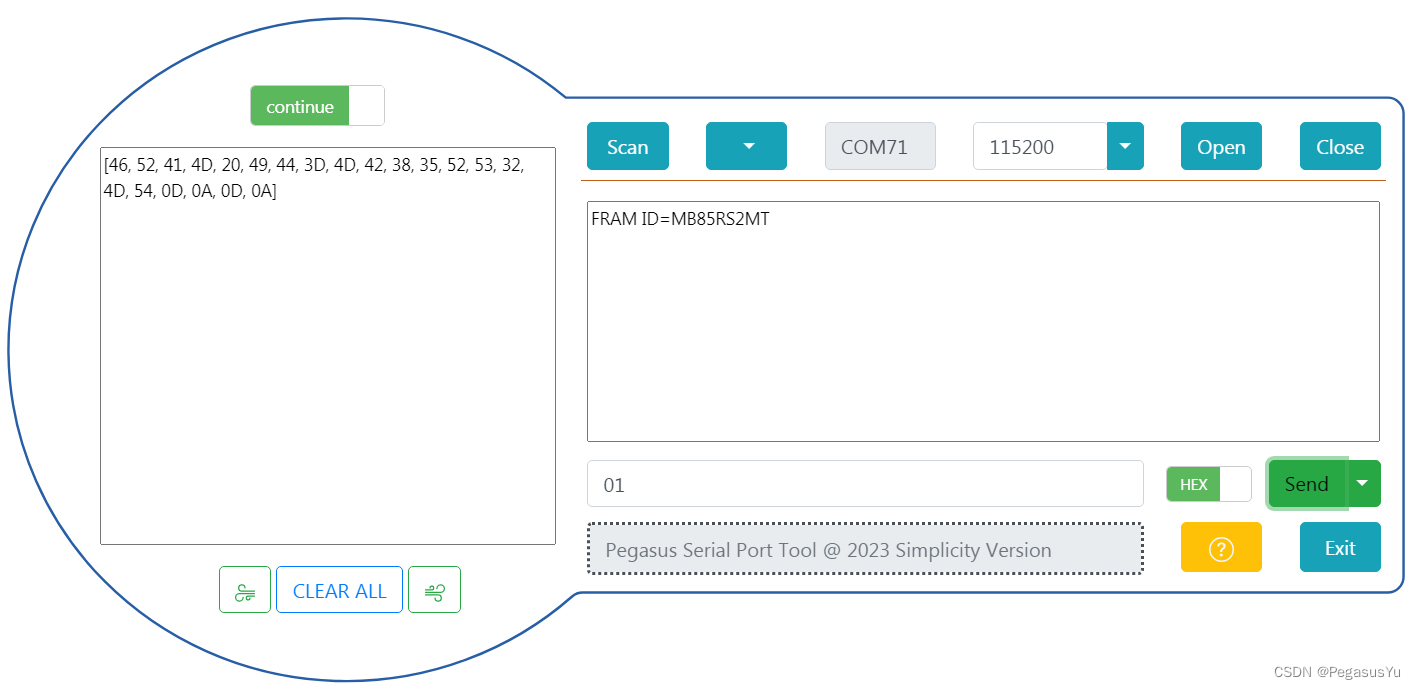
串口指令0x02测试效果如下:
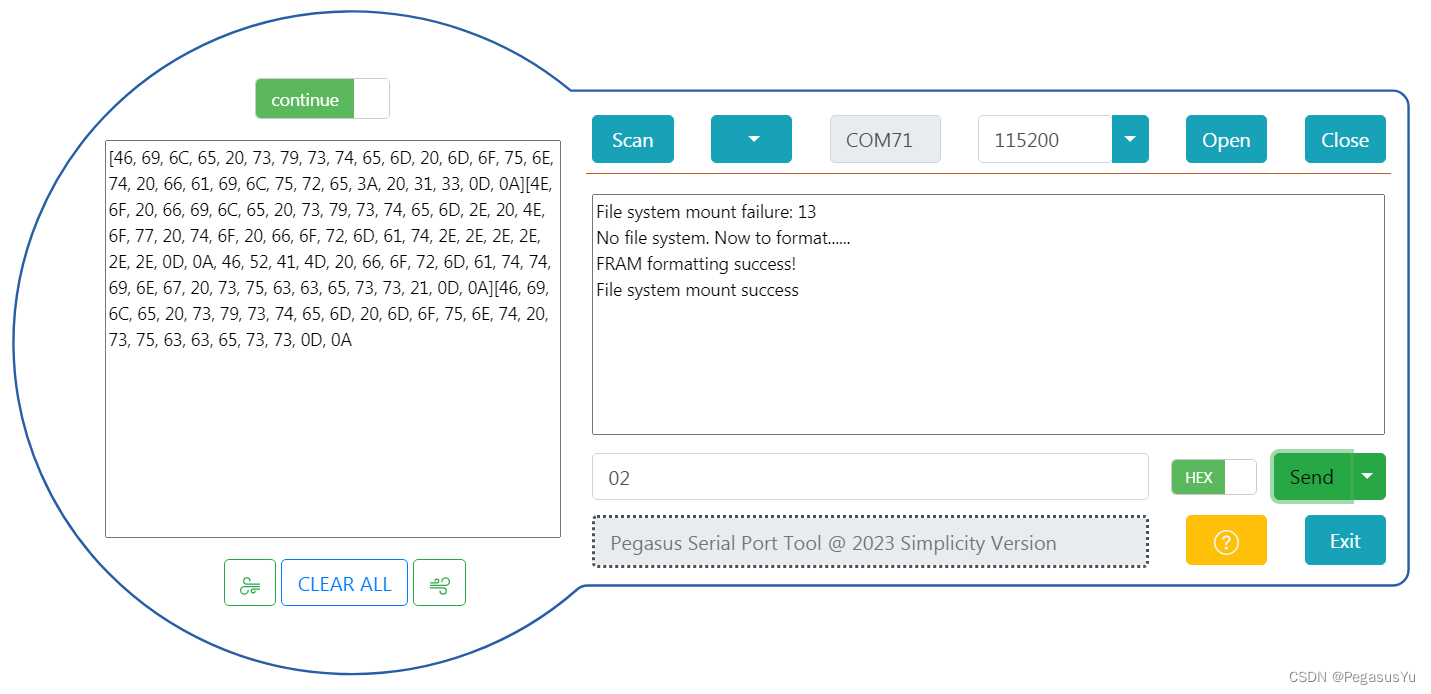
串口指令0x03测试效果如下:
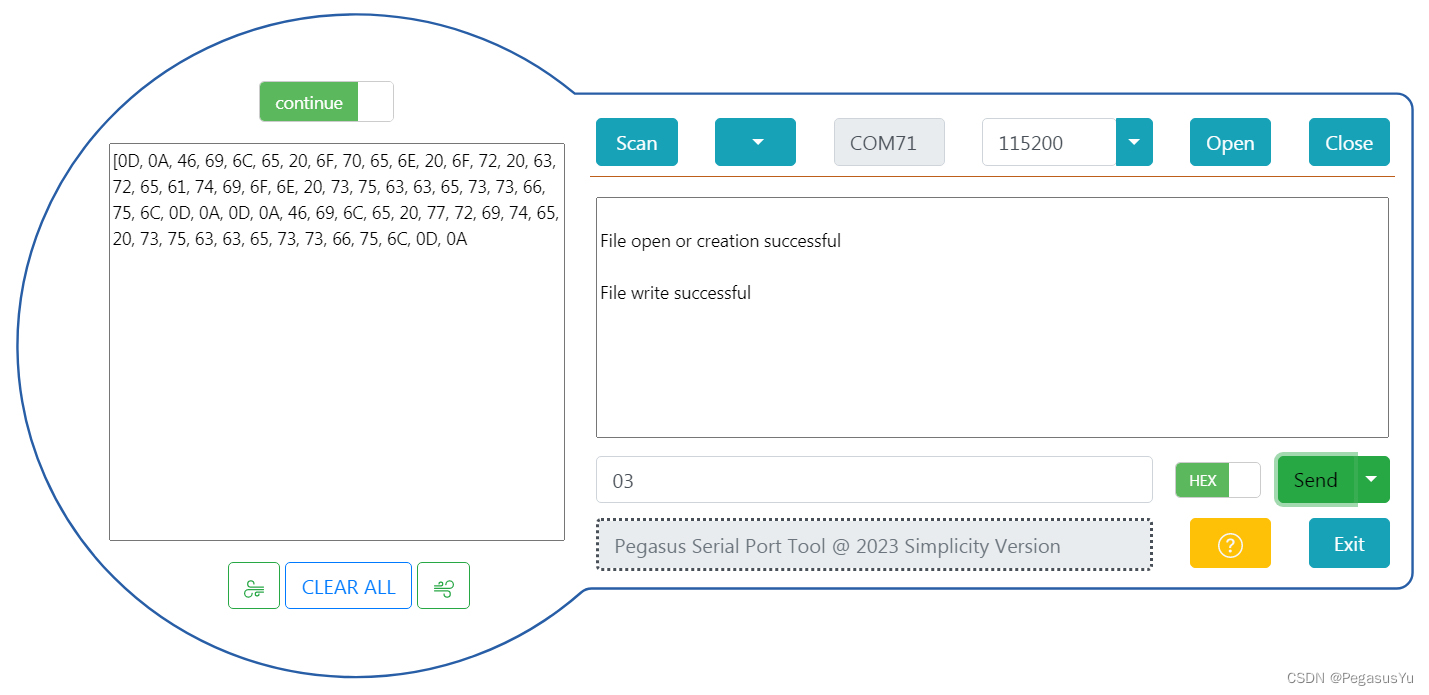
串口指令0x04测试效果如下:
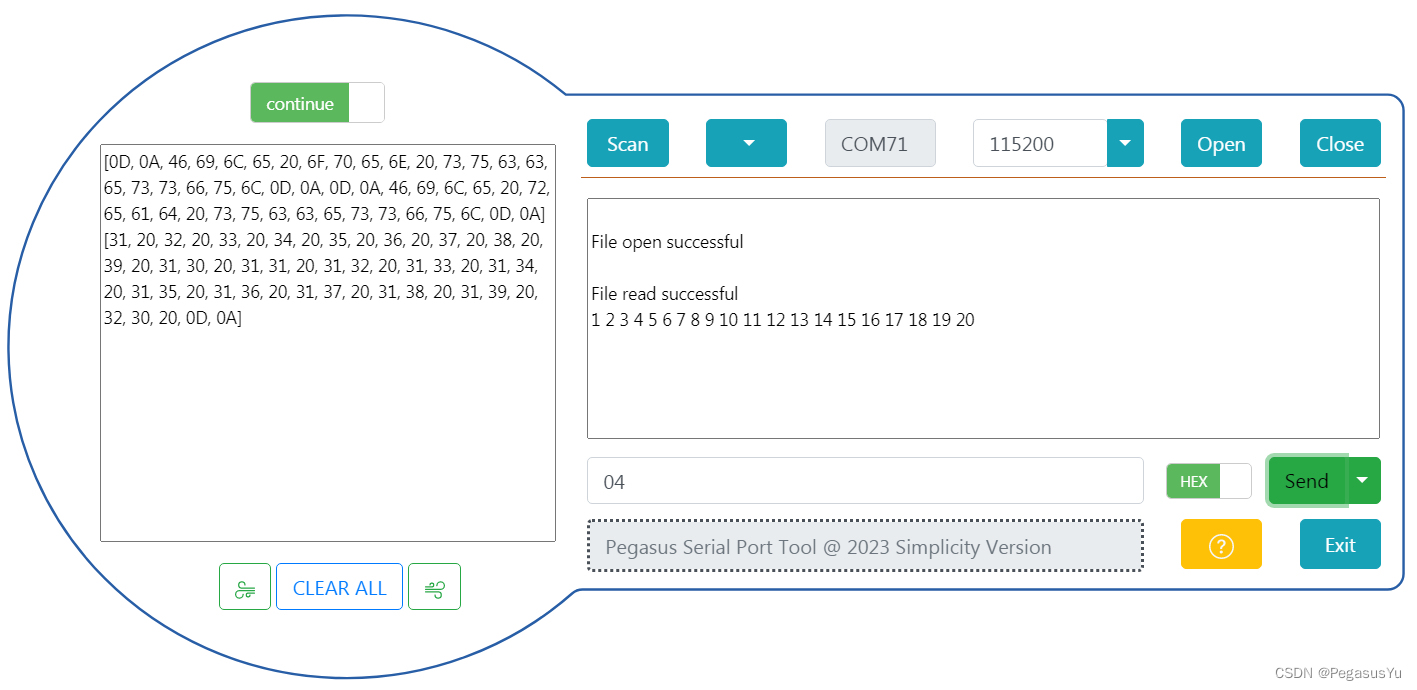
串口指令0x05测试效果如下:
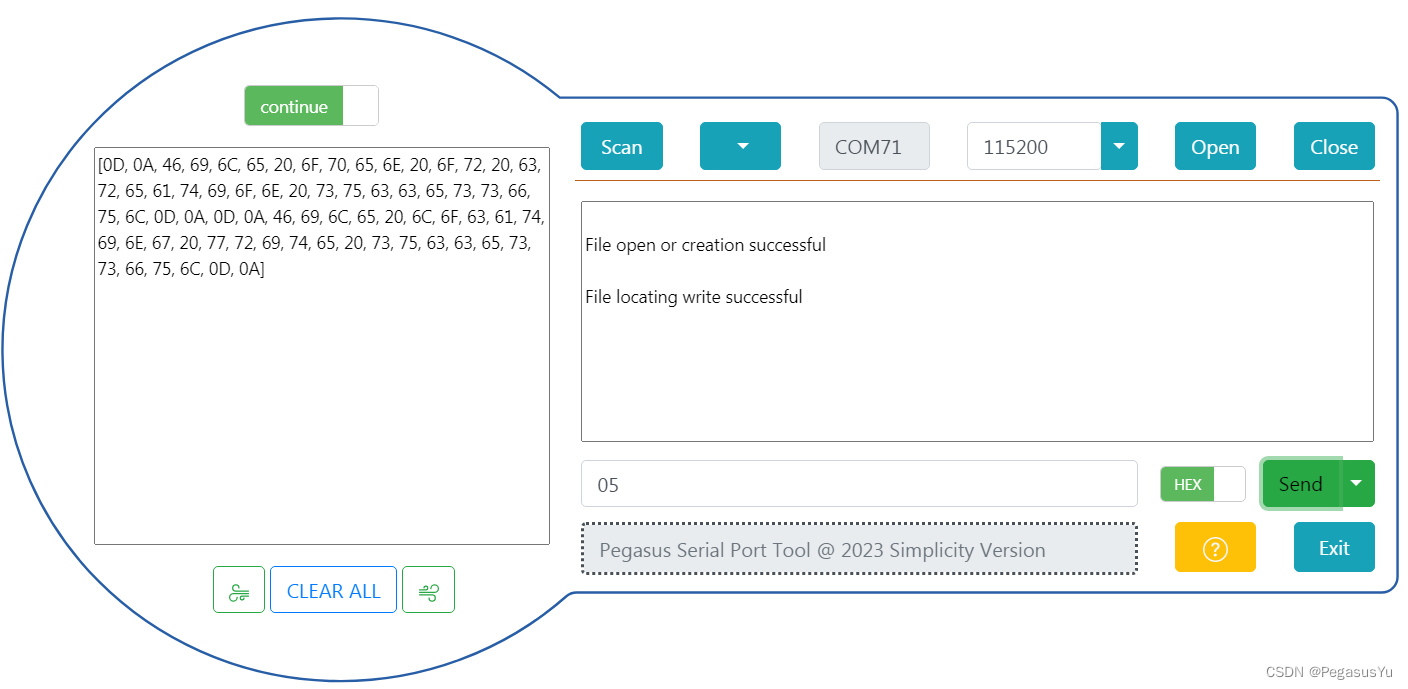
串口指令0x06测试效果如下:
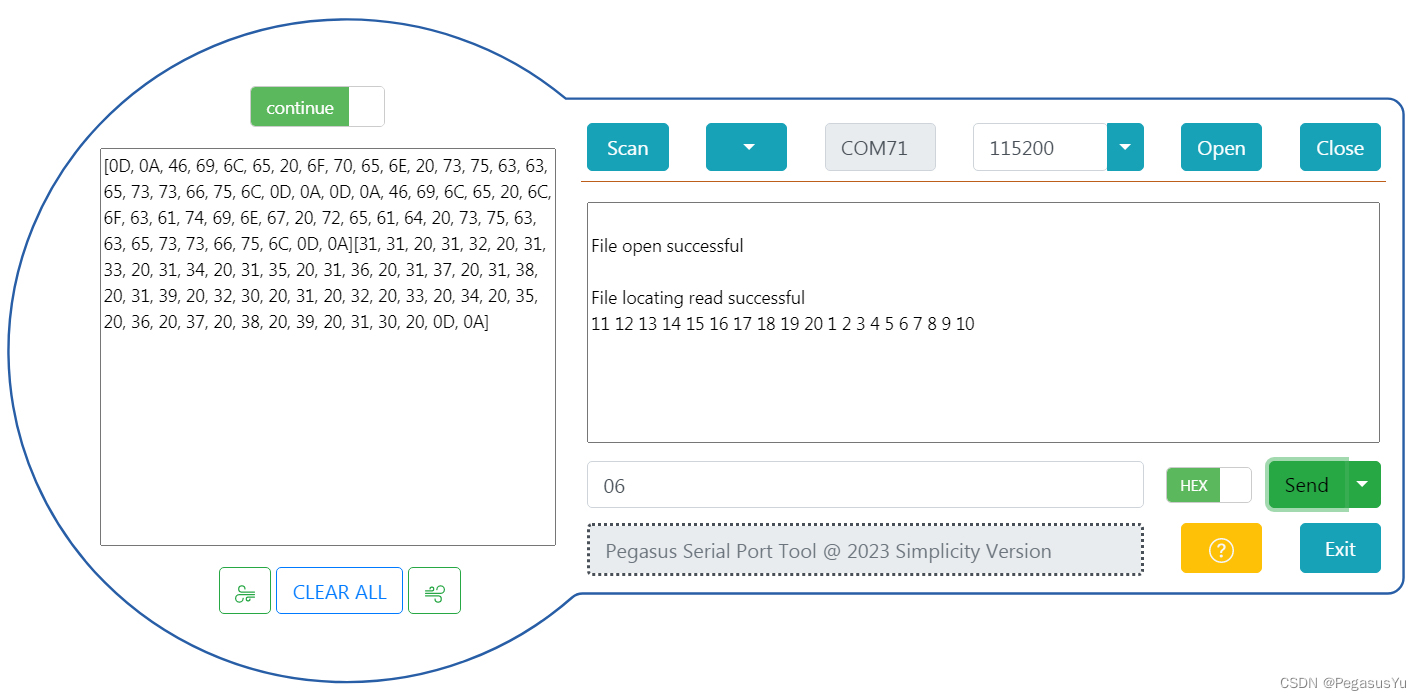
STM32例程下载
STM32F401CCU6 SPI总线FATS读写FRAM MB85RS2M例程下载
–End–








![[牛客周赛复盘] 牛客周赛 Round 28 20240114](https://img-blog.csdnimg.cn/direct/981dbe40219348a08671fca2fa779a75.png)


